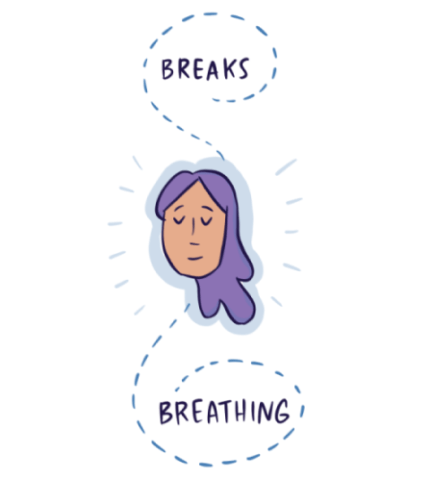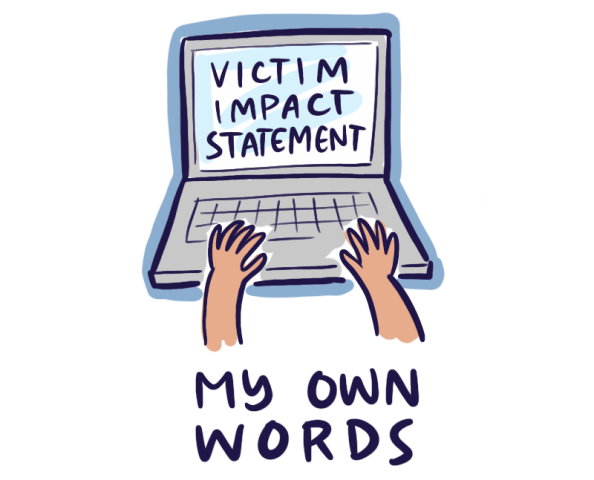About going to court
If you have never been to court, it can be hard to know what to expect. You may have a lot of questions and be feeling unsure about what is going to happen.
Lots of young people give evidence in court. There is help for you and your family or carer.
Below is some general information about what it is like to give evidence, where you will be, and who will be with you. There is also information on words you may hear and people you will meet during the court process.
Your Child and Youth Witness Service (CYWS) practitioner can provide information and updates on your specific court matter.
What is a court?
A court is a building with different rooms, including courtrooms, where people often go to give evidence. Giving evidence is telling a court what you know.
If you are a witness, you know something important. You will be asked questions in court about what you know. This could be:
- what you heard
- things you saw
- what someone else told you.
How the CYWS helps you
The CYWS can help you by:
- telling you what happens when you give evidence
- helping you understand the court process
- supporting you when you give evidence
- letting you know what will happen next
- going to meetings about the case with you and helping you to ask questions and share your views
- answering questions about the process
- linking you in with other services.
We also have a court dog, Kiki, who may be able to support you when you give evidence. More information about Kiki is available at Court Dog Program.
Being a witness - animated video
Watch Emily and James talk about their experience of being a witness and how the CYWS helped them.
Remember that the court process is different for everyone.
Your CYWS practitioner can give you more information on what the process will be for you.
You may be eligible for an intermediary.
For more information see About the Intermediary Program or talk to your CYWS practitioner.
Important definitions
Some words used throughout the video:
Hearing – At a hearing lawyers present information to a judge or magistrate, usually in a courtroom. See our infographics on court hearings for summary and indictable offences for more details.
Intermediary – An intermediary is an expert in helping people communicate with each other. They help victims and witnesses understand questions and provide answers in police interviews and in court.
Prosecution – The lawyers who tell the judge or magistrate that the accused person has committed a crime are called the prosecution.
Defence – The lawyers who represent the accused person are called the defence.
More words and their meanings can be found at Words used in the justice system.
Why am I a witness?
If you have been told that you are going to be a witness, a few things have probably happened already:
- You have most likely spoken to police about a crime and the police have done an investigation and collected evidence.
- The police will have made a video recording of you telling them what happened, or you may have made a written statement.
- The person accused of committing the crime will have been charged with the offence/s.
The accused person will need to go to court to tell the judge or magistrate whether they are pleading guilty (they say they committed the crime) or not guilty (they say they did not commit the crime).
You may have been asked to be a witness because:
- someone has been accused of committing a crime against you, or
- someone has been accused of committing a crime against someone else, and you have information about what happened.
If the accused person says they committed the crime (pleads guilty) before you give evidence, you will not need to be a witness.
If they say they did not commit the crime, the court needs to hear what you told police and for you to answer some questions to help work out what happened.
Giving evidence
What happens before I give evidence?
A practitioner from the CYWS will work with you to help you feel prepared to give evidence.
Before giving evidence, you can watch the recording you made with police or read your statement to help you remember what you said.
Where will I give evidence from?
When adults are witnesses, they usually give evidence in a courtroom, but it's different for children and young people.
Most children and young people give evidence from a room away from the court. This room has a screen like a television where you can see and hear what is happening in the courtroom. It may be in the same building as the court or a different building.
If you give evidence from the CYWS building in Melbourne, called Garragarrak, you will be in a room designed especially for young people to give evidence from. Our facility is separate from the court building.
There are photos on the Garragarrak page if you want to know what it looks like.
See the infographic 'Who will be in Court?' to learn more about the room the judge and lawyers will be in.
What happens when I give evidence?
You will have someone from the CYWS with you when you give evidence.
The judge or magistrate may ask you a few questions about yourself and they will talk to you about the importance of telling the truth. You will be asked to promise to tell the truth either by taking an oath or an affirmation.
An oath is a religious promise, often made while holding a Bible or other religious text.
An affirmation is a non-religious promise to tell the truth.
If there is a video recording of you talking with police about what happened, the people in the court will watch the video. Lawyers from the prosecution and defence will ask you questions to get more information about what you said in the video. The judge or magistrate can also ask questions about your evidence.
It's OK if you need to take a break while giving evidence.
The jury, judge or magistrate think about all the information they have heard and seen before making a decision. They will think about what you have told them. They will also think about the things that other witnesses and lawyers have said.
When you are a witness, you just need to tell the court what you know. You are not responsible for what they decide.
Victim Impact Statements
If the accused person pleads guilty or is found guilty you can prepare a Victim Impact Statement.
Making a Victim Impact Statement is an opportunity to tell the court how the crime has affected you.
It is different to the recording that you made with police, and it is different to giving evidence.
You don’t have to make a Victim Impact Statement if you don’t want to.
If you decide you would like to write a Victim Impact Statement, the CYWS can help you.
If you want to, you can read your statement to the court or have someone else read it for you. Victim Impact Statements are given to the judge or magistrate at a plea hearing. The judge may talk about your statement at the sentencing hearing when explaining the penalty.
More information can be found at Victim Impact Statements.
Other support available
When you give evidence you can use weighted blankets, essential oils, or stress balls and other fidgets, if these help you.
Our Court Dog, Kiki, may be able to sit with you while you give evidence. To learn more about Kiki, see Court Dog Program.
If you have a specific item that helps you to feel safe, you can talk to us about bringing it with you. We can also connect you with specialist services, such as counsellors and LGBTIQA+ specific services.
Your personal information
Information collected by the CYWS
The CYWS will collect information about you and your family to assist us to provide our service to you. This can include:
- names, addresses, date of birth and contact details
- culture
- identity (such as LGBTIQA+)
- health information
- details about who is in your family
- any needs you have
- any concerns you have about the process that we can help with
- details about other agencies you are engaged with.
You can tell us about yourself, and you can tell your CYWS practitioner if you don’t want some information recorded on your file.
Sharing of your information
If you are working with other programs or people, we may share some of your information with them.
For example, we may share some information with the Intermediary Program, your counsellor or someone else.
We also talk to the Office of Public Prosecutions or the Police about what should happen and why, to make sure you are best supported.
We will only share relevant information and will not tell anyone anything about you that they don’t need to know. Whenever possible, we will ask you first if it is OK to share information.
There may be times where we are worried about you, and we may need to share information with your parents or carers or someone else we trust to make sure you are safe. Sometimes we can’t ask you before we do this.
There are also some situations where the law says that we can, or we must, give your information to someone else. We will talk to you later about why we did that.
Further information, including how to access your personal information, is available at privacy and your personal information.
Contact and feedback
Contact us
You can call or email us to ask us for help.
You can also ask Victoria Police, the Office of Public Prosecutions, your lawyer, or anyone else to ask us to help you.
Our email address is ChildandYouthWitnessService@justice.vic.gov.au and you can call us on 1300 790 540 (9 am to 5 pm, Monday to Friday).
Once a CYWS practitioner has been assigned to you, you can contact them directly.
Give feedback
We would like to hear about your experience with the CYWS.
Please see Feedback for the CYWS for more information.
Updated







